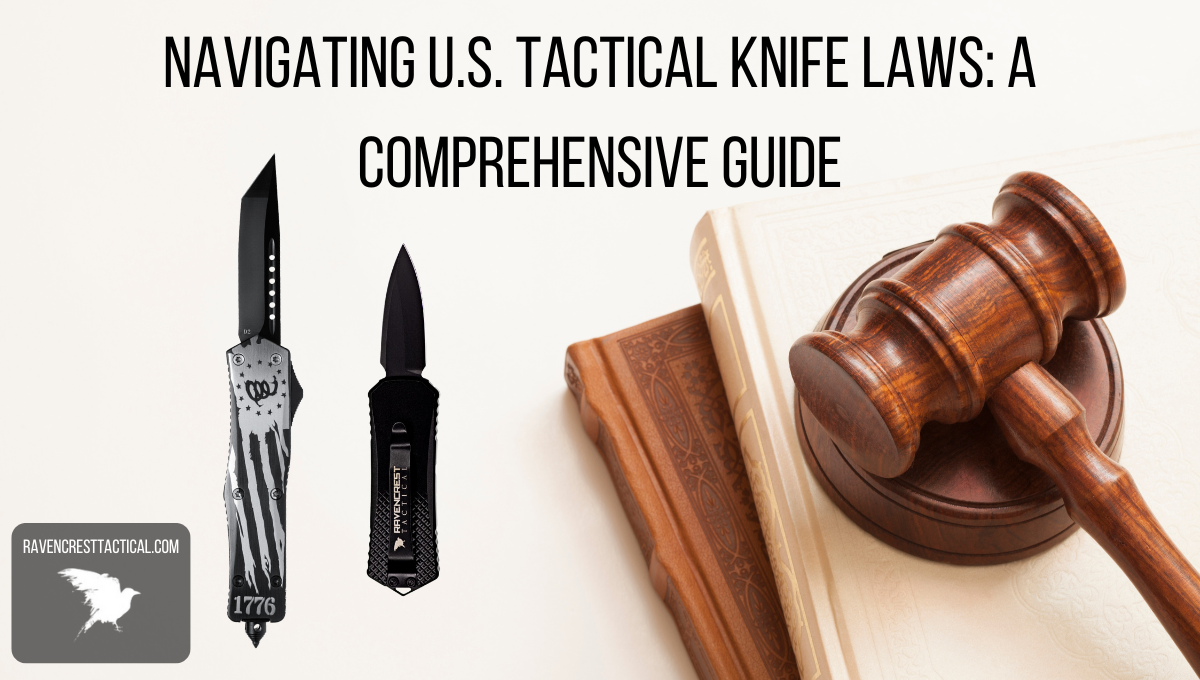Navigating U.S. Tactical Knife Laws: A Comprehensive Guide

Tactical knives have become essential tools for outdoor enthusiasts, first responders, and anyone who values preparedness. However, understanding the complex legal landscape surrounding the possession, carrying, and use of these knives in the United States is crucial. This guide provides a thorough examination of U.S. tactical knife laws, focusing on state-specific regulations, blade length restrictions for everyday carry (EDC) knives, and the legalities of carrying concealed tactical knives.
State-by-State Breakdown of Tactical Knife Regulations
The United States has a diverse range of knife laws, with each state setting its own regulations. Understanding these differences is vital for responsible knife ownership. Here’s an overview of knife laws by state:
Permissive States
- Arizona: Arizona has some of the most lenient knife laws, with minimal restrictions on carrying and possession.
- Vermont: Vermont also has permissive laws, allowing most types of knives to be carried and possessed.
- New Hampshire: New Hampshire aligns with this trend, permitting the carry of various knife types.
Moderate States
- Texas: Texas allows the possession of most knives but imposes restrictions on carrying certain knives in specific locations.
- Florida: Florida generally permits the ownership and carrying of knives, though it restricts switchblade and ballistic knives.
- California: California enforces strict regulations on switchblades, disguised knives, and dirks/daggers.
Restrictive States
- New York: New York has stringent laws, prohibiting the carrying of switchblades, gravity knives, and similar types.
- New Jersey: New Jersey is known for its strict knife laws, restricting or banning many types of knives.
- Massachusetts: Massachusetts has complex regulations with various restrictions on carrying and owning certain knife types.
It’s important to note that within these categories, there may be nuances and exceptions. Always consult local and municipal laws for more specific information. Ignorance of the law is not a valid defense.
Blade Length Restrictions for EDC Knives
Blade length restrictions for EDC knives are common across many states to ensure these tools are used primarily as tools and not weapons. Here’s what you need to know about these limitations:
Federal Regulations
At the federal level, there are no specific blade length restrictions for EDC knives. However, federal laws govern the possession of certain types of knives, such as switchblades and automatic knives, which may be regulated or prohibited with some exceptions.
State-Specific Blade Length Restrictions
- 3 inches or less: States like Texas, Colorado, and Oregon often allow EDC knives with blades 3 inches or shorter.
- 4 inches or more: States such as New York and Massachusetts may have stricter regulations, limiting EDC knives to blades shorter than 4 inches.
Research the specific laws in your state and any local ordinances that may impose additional restrictions.
Legally Carrying Concealed Tactical Knives
Carrying concealed tactical knives adds complexity to knife ownership. Concealed carry means carrying a knife in a way that is not visible to casual observers. Here’s what you need to know:
Concealed Carry Laws by State
Concealed carry laws for tactical knives vary widely. Some states allow concealed carry with a valid permit, while others have stricter regulations or outright bans. Knowing the laws in your state is essential to avoid legal issues.
The Role of Concealed Carry Permits
In states where concealed carry is allowed, obtaining a concealed carry permit is often necessary. These permits usually involve background checks, fingerprinting, and training. The specific requirements and processes vary by state.
Training and Responsibility
Even in states where concealed carry of tactical knives is legal, proper training and responsible ownership are crucial. Understanding when and how to use your knife for self-defense is essential to avoid legal complications.
Choose RavenCrest Tactical OTF Knives
Now that you’re informed about the legal regulations surrounding tactical knives in the U.S., it’s time to make an informed choice. RavenCrest Tactical offers a wide range of high-quality OTF (Out The Front) knives that meet various legal requirements across different states.
Visit RavenCrest Tactical’s website to explore their extensive collection of OTF knives. Choosing RavenCrest Tactical ensures you stay within legal boundaries while investing in a reliable tactical knife suitable for various situations.
Understanding and adhering to knife laws is essential for responsible knife ownership. While the legal landscape can be intricate, having the right knowledge and a reliable source like RavenCrest Tactical helps you navigate it successfully. Make an informed choice today to ensure your safety, compliance, and peace of mind.
Disclaimer: This article provides general information about legal regulations for tactical knives in the United States and is not intended as legal advice. The information presented here should not be considered a substitute for professional legal counsel. Knife laws can vary significantly by state and may change over time. Conduct thorough research and consult with legal authorities or professionals in your specific jurisdiction to understand the most up-to-date and accurate information concerning knife laws. Ignorance of the law is not a valid defense; adherence to local and state laws is the responsibility of the individual knife owner.
